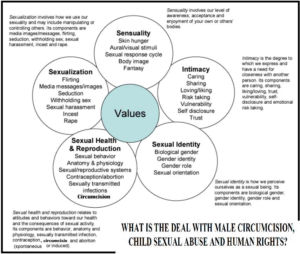WHAT IS THE DEAL WITH MALE CIRCUMCISION, CHILD SEXUAL ABUSE AND HUMAN RIGHTS?
Circles of Sexual Health & Reproduction and Sensuality


The Circles of Sexuality, developed by Dennis Dailey in 1981, is a holistic framework for understanding the complexities of human sexuality. It consists of five interconnected circles, all impacted by our values. Over the next posts, we will focus on each circle and how circumcision could impact these components. This post will focus of sexual health and reproduction, and sensuality.
A general overview: https://healthymen.net/blog/male-circumcision-sexuality/
Male circumcision is a practice that has been surrounded by a variety of beliefs and cultural narratives for centuries. Understanding the effects of male circumcision on sexuality is crucial for both individuals and couples navigating their sexual health. This article will explore the myths and realities surrounding male circumcision, its impact on sexual health, intimacy, and the cultural perceptions that shape these discussions.
1. Circle of Sexual Health & Reproduction:
Focuses on the importance of sexual health and reproductive rights. Here are some links that reference circumcision as related to sexual health and reproduction.
https://www.healthline.com/health/mens-health/circumcised-vs-uncircumcised#lubrication
The main difference between a circumcised (cut) and uncircumcised (uncut) penis is the presence of foreskin around the head of the penis. Both options can affect hygiene and overall health.
https://www.nature.com/articles/s41443-020-00354-y
Male circumcision (MC) is the first planned surgical procedure ever performed. Nowadays many of these procedures are not necessarily carried out in a medical environment, therefore the real number remains unknown, but it is estimated that one third of the men are circumcised. Some authors argue the negative impact of MC on men psychology and sexual life, but objective data are lacking. The purpose of this review is to summarize in the best possible way the literature to clarify this matter. A non-systematic narrative review was performed including articles between 1986 and 2019. The search for literature was carried out between July 2019 to October 2019 and any updates as of March 30, 2020. Although many authors support the hypothesis that circumcision status has an impact on sexual functioning, a negative outcome has not yet been entirely proven. Circumcision might affect how men perceive their body image and consequently affect their sexual life. We should consider this when analysing the literature about MC and sexual dysfunction, as many of the results are based on specific populations with different attitudes towards this procedure.
Sexual function consists of many elements that not only relate to measurable facts such as anatomy, somatosensory and histology. An objective evaluation of the impact of circumcision on sexuality is still challenging, as it affects a wide variety of people that confront sexuality differently due to their sociocultural and historical background. Therefore, individuals can either perceive their circumcision status as a blessing or a curse depending on the values and preferences of the different communities or social environments where they belong.
https://academic.oup.com/smr/article-abstract/11/4/412/7135857
Despite the conflicting data reported in articles, the weight of the scientific evidence suggests there is not sufficient data to establish a direct association between male circumcision and sexual dysfunction. This review provides clinicians with an updated summary of the best available evidence on male circumcision and sexual dysfunction for evidenced-based quality of care and patient education.
2. Circle of Sensuality:
The appreciation and enjoyment of physical sensations and experiences. Here are some links that reference circumcision as related to sensuality.
- https://www.bing.com/videos/riverview/relatedvideo?q=circumcision+and+sexuality&mid=60967181EA9B1B9D653760967181EA9B1B9D6537&mmscn=stvo&FORM=VIRE
- https://www.psychologytoday.com/us/blog/all-about-sex/202311/does-circumcision-impair-mens-sexualsensitivity?msockid=3b1d5105692f6e60345f440d68b26f41
Circumcision, the surgical removal of the foreskin tissue that covers the head (glans) of the penis, elicits strong emotions. Whenever I’ve discussed the robust literature showing that it causes men no sexual harm, the feedback—overwhelmingly from opponents—has been vitriolic, even threatening.
Opponents argue that the foreskin is rich in touch-sensitive nerves, and therefore, circumcision must reduce the penis’ sexual sensitivity, impairing erotic function, orgasm, and satisfaction. Proponents counter that circumcision has no measurable impact on men’s sexuality and that it offers important medical benefits, notably reduced risk of AIDS and several sexually transmitted vaginal infections. Recently, two studies have added to the substantial literature showing that circumcision does not impair men’s sexual pleasure.
https://pubmed.ncbi.nlm.nih.gov/17155977/
There were no significant differences in sexual drive, erection, ejaculation, and ejaculation latency time between circumcised and uncircumcised men. Masturbatory pleasure decreased after circumcision in 48% of the respondents, while 8% reported increased pleasure. Masturbatory difficulty increased after circumcision in 63% of the respondents but was easier in 37%. About 6% answered that their sex lives improved, while 20% reported a worse sex life after circumcision.
https://link.springer.com/article/10.1007/s10508-023-02543-4
Research exploring the impact of penile circumcision on aspects of body image is scarce and few studies have considered the potential roles of attitudinal factors toward one’s own circumcision status. The purpose of the present study was to assess the potential relationship between one’s circumcision status, happiness with circumcision status, genital self-image, and sexual functioning. The present study also examined how happiness with circumcision status varied across geographic regions. A total of 205 participants (102 circumcised, 103 not circumcised) completed a study through online recruitment methods. Participants reported being born in the United States (n = 80), Canada (n = 23), and various countries within Latin America (n = 22), Europe (n = 49), Asia (n = 13), Africa (n = 11), and Oceania (n = 7). Participants who were not circumcised reported significantly greater happiness with their circumcision status than participants who were circumcised. However, genital self-image, sexual body image, and sexual functioning did not significantly differ by circumcision status. Instead, participants who reported being happier with their circumcision status reported better genital self-image and less body exposure avoidance during sex, but sexual function did not differ by happiness. Although researchers hypothesized that happiness with circumcision status would depend on whether one fits in with the majority circumcision status within their region of origin, results did not support this. Participants who were circumcised tended to have less happiness with their circumcision status than non-circumcised participants regardless of region of birth. These findings support a small body of the literature which suggests that the psychosexual impact of penile circumcision may rely more on attitudinal factors toward circumcision status than actual circumcision status.
Conclusion: There was a decrease in masturbatory pleasure and sexual enjoyment after circumcision, indicating that adult circumcision adversely affects sexual function in many men, possibly because of complications of the surgery and a loss of nerve endings.
Join the conversation with other boys and young men by linking in at
These posts are to give you information that we feel you need to participate in the decision on circumcision. Most decisions are
made by our parents, so perhaps you need to share these posts with them as well.
As a reminder, let’s review again what consent is. The dictionary has a simple definition, “permission for something to happen or agreement to do something”. Consent implies that you have full information about what you are consenting to. What does that mean for whether you consented to be circumcised?
- Consent is freely given. There is no pressure or manipulation, including bullying or other criticism for the choice.
- It is reversible. Someone should be able to change their minds at any time. Even if they said yes early on, they could say no
after that, even if they are on the table for the procedure, they can still say no. - Consent is wanting to do it. It is doing only those things that someone feels comfortable doing. They should not be
expected to do things they don’t want to do. - Consent is specific. If someone says yes to circumcision, this does not mean they are saying yes to how the circumcision is
being done. - It is informed. Someone cannot actively and freely agree if they don’t have the full information.
Our next post is about two more of the circles of sexuality: Intimacy and Sexual Health & Gender Identity.



 Each child’s survival story will be different depending on their age, gender, family, experience, and many other factors in their environment.
Each child’s survival story will be different depending on their age, gender, family, experience, and many other factors in their environment. This is an online game which can be played by a family with easily obtainable materials to help families recognize and talk about how they are adjusting to the new normal.
This is an online game which can be played by a family with easily obtainable materials to help families recognize and talk about how they are adjusting to the new normal. Patakarang pangkaligtasan para sa proteksiyon laban sa pang aabusong sekswal, ito ang tinatawag na Mga PATAKARAN SA PAGHAWAK
Patakarang pangkaligtasan para sa proteksiyon laban sa pang aabusong sekswal, ito ang tinatawag na Mga PATAKARAN SA PAGHAWAK This video introduces you to one form of prevention of sexual violence on children: Teaching personal safety to children/students, their teachers and their parents.
This video introduces you to one form of prevention of sexual violence on children: Teaching personal safety to children/students, their teachers and their parents. Mga magulang/ taga pag alaga, ang pag unawa sa ating mga damdamin at kung paano ang reaksiyon ng ating katawan dito ay mahalaga para sa ating kaligtasan.
Mga magulang/ taga pag alaga, ang pag unawa sa ating mga damdamin at kung paano ang reaksiyon ng ating katawan dito ay mahalaga para sa ating kaligtasan. Storytelling is an easy way to teach. CPTCSA has products to help families read to children to help them understand the concepts for personal safety and getting help. Click here to see and hear the story of Erika and Jay as they learn the touching rule. This book is also available on our website to purchase hard copies.
Storytelling is an easy way to teach. CPTCSA has products to help families read to children to help them understand the concepts for personal safety and getting help. Click here to see and hear the story of Erika and Jay as they learn the touching rule. This book is also available on our website to purchase hard copies. 